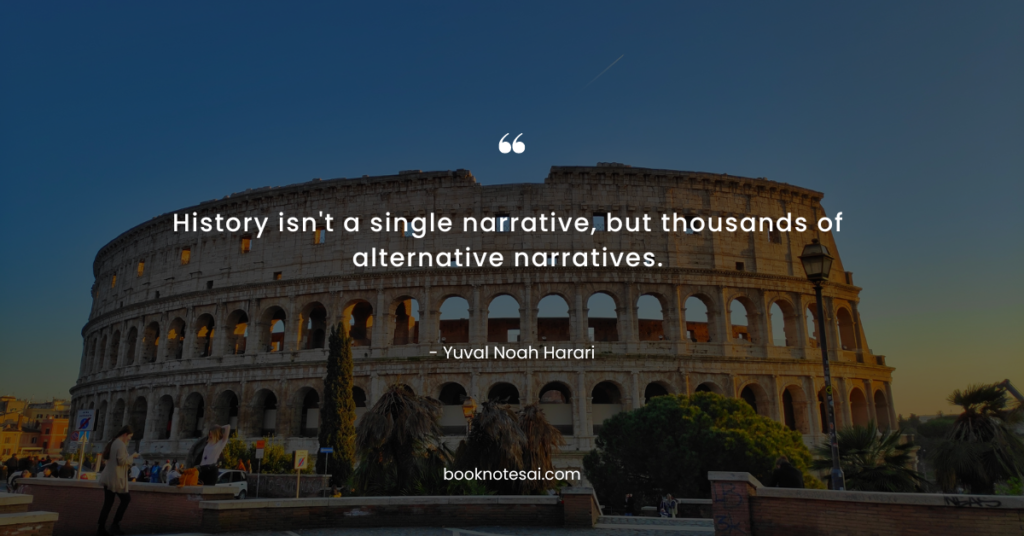Listen To This Post
Sapiens Summary: A Brief History of Humankind.
One hundred thousand years ago, at least six different species of humans inhabited Earth. Yet today there is only one—homo sapiens.
What happened to the others?
And what may happen to us?

This is a book summary for Sapiens: A Brief History of Humankind by Yuval Noah Harari. The key facts are organized to be easy to use, clear, and very valuable, all while helping you save loads of time.
Introduction: Why this book?
- Sapiens: A Brief History of Humankind offers a compelling exploration of the journey of our species, from our humble beginnings to the complexities of modern society.
- By delving into our shared history, Yuval Noah Harari provides invaluable insights into the forces that have shaped human civilization, making it essential reading for anyone seeking to understand the world and themselves.
Sapiens Summary:
- Harari takes readers on a captivating journey through the history of Homo sapiens, from the emergence of our species in Africa to the present day.
- He explores key milestones such as the Agricultural Revolution, the formation of complex societies, and the impact of scientific and technological advancements.
- Through thought-provoking analysis, Harari challenges conventional wisdom and offers fresh perspectives on the human experience.
- The book delves into topics such as the development of language, the rise of empires, and the interconnectedness of global cultures.
- Ultimately, Harari invites readers to reflect on what it means to be human in an ever-changing world.
💡 5 Big Ideas
- The Cognitive Revolution: Harari explores how the development of language and abstract thinking propelled Homo sapiens to dominance.
- The Agricultural Revolution: By transitioning from hunter-gatherer societies to settled agriculture, humans transformed their relationship with the environment and each other.
- The Emergence of Religion and Culture: Harari examines how shared myths and beliefs helped unite human communities and foster cooperation.
- The Impact of Imperialism: Through the lens of imperialism, Harari illustrates the complexities of power dynamics and cultural exchange.
- The Challenges of the Modern Age: From technological innovation to ecological crises, Harari prompts readers to consider the implications of our rapidly changing world.
In summary, Harari’s exploration of these big ideas offers profound insights into the human condition and the forces that have shaped our collective destiny.
Powerful Quotes
- “The real difference between us and chimpanzees is the mysterious glue that enables millions of humans to cooperate effectively.”
This quote highlights the unique ability of humans to collaborate on a large scale, distinguishing us from other species. - “Homo sapiens has no natural rights, just as spiders, hyenas, and chimpanzees have no natural rights.”
This quote emphasizes Harari’s perspective on human rights as social constructs rather than inherent qualities. - “Money is the most universal and most efficient system of mutual trust ever devised.”
Harari explores the significance of money as a trust-building mechanism in human societies. - “There is no justice in history.”
This quote challenges the notion of historical progress and highlights the arbitrary nature of human events. - “Homo sapiens is just not built for satisfaction.”
Harari reflects on the human tendency towards perpetual discontent, driving our pursuit of progress and innovation. - “The pursuit of an easier life resulted in much hardship.”
This quote underscores the unintended consequences of human endeavors throughout history. - “History isn’t a single narrative, but thousands of alternative narratives.”
Harari encourages readers to consider the diversity of human experiences and perspectives. - “Luxuries tend to become necessities and spawn new obligations.”
This quote explores the phenomenon of lifestyle inflation and its impact on human behavior. - “We study history not to know the future but to widen our horizons, to understand that our present situation is neither natural nor inevitable.”
Harari emphasizes the importance of historical perspective in navigating the complexities of the present. - “The pursuit of an easier life resulted in much hardship.”
This quote underscores the paradoxical nature of human progress, which often entails unforeseen challenges.
One Reason To Read This Book:
Embark on a profound journey through the annals of human history, gaining invaluable insights into the forces that have shaped our world and our species.
Who should I recommend Sapiens: A Brief History of Humankind Summary to?
Whether you’re a history enthusiast, a curious thinker, or simply seeking a deeper understanding of humanity, this summary offers a captivating glimpse into our shared past and present.
Recommendations:
- “Homo Deus: A Brief History of Tomorrow” by Yuval Noah Harari
- “Guns, Germs, and Steel: The Fates of Human Societies” by Jared Diamond
- “The Origins of Political Order: From Prehuman Times to the French Revolution” by Francis Fukuyama
This summary serves as a complimentary guide to the reviewed title Sapiens: A Brief History of Humankind, offering key insights. For a deeper understanding, we encourage you to explore the full book.


